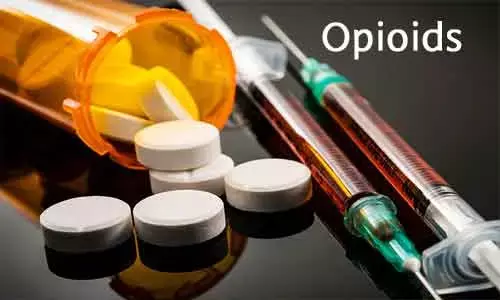- Home
- Medical news & Guidelines
- Anesthesiology
- Cardiology and CTVS
- Critical Care
- Dentistry
- Dermatology
- Diabetes and Endocrinology
- ENT
- Gastroenterology
- Medicine
- Nephrology
- Neurology
- Obstretics-Gynaecology
- Oncology
- Ophthalmology
- Orthopaedics
- Pediatrics-Neonatology
- Psychiatry
- Pulmonology
- Radiology
- Surgery
- Urology
- Laboratory Medicine
- Diet
- Nursing
- Paramedical
- Physiotherapy
- Health news
- Fact Check
- Bone Health Fact Check
- Brain Health Fact Check
- Cancer Related Fact Check
- Child Care Fact Check
- Dental and oral health fact check
- Diabetes and metabolic health fact check
- Diet and Nutrition Fact Check
- Eye and ENT Care Fact Check
- Fitness fact check
- Gut health fact check
- Heart health fact check
- Kidney health fact check
- Medical education fact check
- Men's health fact check
- Respiratory fact check
- Skin and hair care fact check
- Vaccine and Immunization fact check
- Women's health fact check
- AYUSH
- State News
- Andaman and Nicobar Islands
- Andhra Pradesh
- Arunachal Pradesh
- Assam
- Bihar
- Chandigarh
- Chattisgarh
- Dadra and Nagar Haveli
- Daman and Diu
- Delhi
- Goa
- Gujarat
- Haryana
- Himachal Pradesh
- Jammu & Kashmir
- Jharkhand
- Karnataka
- Kerala
- Ladakh
- Lakshadweep
- Madhya Pradesh
- Maharashtra
- Manipur
- Meghalaya
- Mizoram
- Nagaland
- Odisha
- Puducherry
- Punjab
- Rajasthan
- Sikkim
- Tamil Nadu
- Telangana
- Tripura
- Uttar Pradesh
- Uttrakhand
- West Bengal
- Medical Education
- Industry
First-ever guidelines for pediatric opioid prescribing released by APSA

Los Angeles - Opioids are useful for pain management following surgery and other major procedures, but until now there had been no recommendations guiding safe use of opioids in children.
American Pediatric Surgical Association (APSA) has established first-ever guidelines for pediatric opioid prescribing.Dr. Kelley-Quon and her colleagues have outlined 20 guidelines for safer pain management in children and adolescents.
Non-opioid analgesics instead of opioids are recommended for certain procedures, including inguinal hernia repair, myringotomy, and meatotomy, for which there was strong evidence of a feasible opioid-free recovery, the team noted in JAMA Surgery.
According to the National Institutes of Health, opioid misuse and addiction in the United States is a national crisis, with an economic burden upwards of $78 billion.
"Many people are aware that there's an opioid epidemic," says Dr. Kelley-Quon, "but when I talk about my work, people are surprised to hear that it impacts children."
One of the primary concerns is the use of opioids among teens and adolescents. Dr. Kelley-Quon cites a CDC report revealing that approximately 9 percent of teens aged 15-19 report receiving an opioid prescription in 2018. This age group is of concern because prescription medications can be used recreationally and shared with friends. In addition, research shows that death due to opioid overdose is on the rise for all age groups.
"Opioids can be very effective in pain management following pediatric procedures," she says, "but we need to work with the medical community to ensure they are used safely and judiciously."
As a member of the American Pediatric Surgical Association's Outcomes and Evidence-Based Practice Committee, Dr. Kelley-Quon led an effort to develop evidence-based guidelines for best practice in opioid prescribing. Her team did an extensive review of scientific and medical publications, but the effort went far beyond a literature search. Dr. Kelley-Quon created a multidisciplinary group that included specialists in pediatric surgery, pediatric anesthesia, and addiction science, and included other key stakeholders representing nursing, physician assistants, surgery trainees, and family advocates. After pooling data from published studies, the entire group met and constructed the guidelines together.
"Opioid prescribing doesn't just impact what a pediatric surgeon does," says Dr. Kelley-Quon. "Nurses and other medical care providers are involved in pain management discussions with patients and their families, so we wanted their input as well."
The team came up with three basic tenets, into which all the guidelines fall. First is simply a recognition that misuse of prescription opioids is a problem to be taken seriously when caring for children and adolescents. Second is to acknowledge there are many non-opioid medications that have excellent data supporting their use for children who require surgery. The team reviewed and presented those options. Finally, health care providers must educate patients and families before and after surgery about what an opioid is, what the risks are, and how they should be safely stored and disposed of.
The publication, endorsed by the American Pediatric Surgical Association, sets the stage to begin shaping policies around prescribing opioids in pediatric medicine, but Dr. Kelley-Quon says we are not there yet.
"We are laying the groundwork," she says. "It is our hope that this work will change paradigms in pain management for children and teens by increasing surgeon awareness and facilitating family engagement.
Main recommendations are as follows-
We recommend all health care professionals caring for children recognize the following points.
Hina Zahid Joined Medical Dialogue in 2017 with a passion to work as a Reporter. She coordinates with various national and international journals and association and covers all the stories related to Medical guidelines, Medical Journals, rare medical surgeries as well as all the updates in the medical field. Email: editorial@medicaldialogues.in. Contact no. 011-43720751
Dr Kamal Kant Kohli-MBBS, DTCD- a chest specialist with more than 30 years of practice and a flair for writing clinical articles, Dr Kamal Kant Kohli joined Medical Dialogues as a Chief Editor of Medical News. Besides writing articles, as an editor, he proofreads and verifies all the medical content published on Medical Dialogues including those coming from journals, studies,medical conferences,guidelines etc. Email: drkohli@medicaldialogues.in. Contact no. 011-43720751


